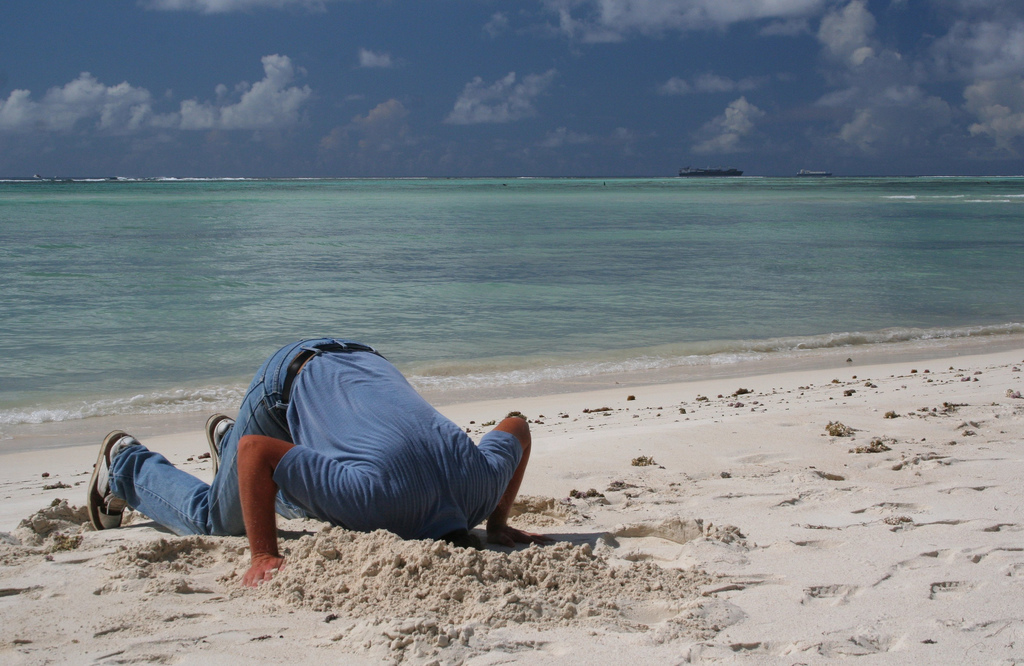In 2006 Sogyal Rinpoche, the world-renowned Tibetan Buddhist teacher and author of the highly acclaimed The Tibetan Book of Living and Dying, called Westerners lazy. I know what you might be thinking, “How could I be lazy if I’m so busy all the time?!?” This is an important question that deserves a little unpacking as it speaks to a pervasive pattern in our culture of distraction in the service of avoidance. This cultural pattern of active avoidance is likely doing harm to our mental and physical health. Let’s take a closer look at what underlies laziness.
Two Methods of Avoidance
The Marriam-webster dictionary defines lazy as, “Disinclined to activity or exertion: not energetic or vigorous. The lazy child tried to avoid household chores.”2 This definition does not at first seem to match the description of our busy active work-driven culture here in the United States. However, if we look at the example phrase we see that the word “avoid” appears. Underneath the behavior of laziness there is almost always a motivation of avoidance.
Sogyal Rinpoche differentiates the traditional style of laziness, which “consists of hanging out all day in the sun, doing nothing, avoiding any kind of work or useful activity, drinking cups of tea and gossiping with friends,” with active laziness, which “consists of cramming our lives with compulsive activity, so that there is no time left to confront the real issues.”1 The former he associates typically with the East and the later the West.
If we assume avoidance is in fact the underlying motivation of laziness, whether conscious or unconscious, then cramming our lives with compulsive activity to avoid facing ourselves is lazy and we must accept that Westerners are in fact quite lazy . . . This might be a tough pill to swallow, but let’s keep exploring because there is also an opportunity here.
A Culture of Distraction
Have you ever had something important and difficult you needed to do, like sit down to consider a new career because what you have been doing just isn’t working anymore, or reaching out to someone, that you kept putting off by filling your life with 10,000 other “important” things? Perhaps you have had the experience of feeling sad or angry and instead of feeling these feelings you just turned on your computer or your television. Or maybe at some point you have been angry at your partner and instead of confronting the issues and speaking with them you decided to stay late at work. Doing these behaviors a few times is fairly harmless, but when they start to occur over and over things really add up and our lives can get stuck in a holding pattern.

It may at first be hard to think of oneself as lazy, especially if between working a full time job and trying to raise a family you barely have time to relax and have some time to yourself. However, I assure you that there is an important shift in perception that can take place when one begins to see the busyness and distraction as a form of avoidance and laziness. The very word “lazy” is an insult to the pride we feel in the West from all our hard work and accomplishments we value so highly, and this is why it is a very important word for undoing this harmful pattern. If you struggle with interpreting lazy as a judgment on your character, try instead to see it as a symptom of our culture and a pattern of distraction and avoidance; this will have a more positive impact.
I have become acutely aware of the pattern of active laziness within myself, the desire to avoid difficult feelings and situations with distraction; and even though it still often pops up, everytime I choose otherwise I end up feeling so much better. When we start to make this shift and face the challenges in our lives and feelings in our bodies head on, we are making a profound statement that our wellbeing is a priority and that we have the ability to take action and the power to heal. This often results in less consumption and more creation and can lead to great healing and transformation.
Maintaining the Status Quo
Our materialistic culture actually has a stake in making sure you stay stuck in a cloud of distraction. Distraction is big business. Our materially focused society runs on the promise that if you work hard and sacrifice you can “get ahead” and if you buy this product, this house, this car, achieve this goal, you will be happy. The massive entertainment industry, including things like sports, television, and video games is a particularly good example of the value our culture places on distraction. Entertainers are some of the highest paid individuals in the world.
Now let’s be clear, there is nothing inherently wrong with entertainment or working hard. The arts and those entertainers that dedicate their lives to creative and athletic endeavors enrich our lives and our culture, and our country was built on hard work.
However, when we start to worship entertainment and money and use it primarily to distract ourselves from the pain in our hearts and the troubles in our lives, then it becomes problematic.
“But it’s hard to change!” Yes it is. When everyone around us is also distracting themselves and active laziness is the norm, it is hard to know when or how to change. In many ways, bravely facing our lives and ourselves, feeling deeply, and asking for support in doing so is like going against the current. It is hard, often takes great courage, and it is often judged and seen as different or odd.

From Quick Fix to Real Fix
We not only live in a culture of endless distraction, but also a culture of quick fixes. As a mental health professional, I see the quick fix mentality all the time. Many people would rather take a pill to “fix” their problems than feel and heal the pain and anger just underneath. It is easier, but it most often does not solve the underlying problem. Advertising has played a huge role in implanting the belief that the quick fix is a real fix and many doctors and psychiatrists are happy to oblige. It is much easier to hand someone a pill than sit with them for many hours while they explore the hidden and stuck grief of the loss of a deep love, or the rage of being hurt and taken advantage of time and time again.
The author and Buddhist teacher, Jack Kornfield, once astutely stated that, “When we get too caught up in the busyness of the world, we lose connection with one another – and ourselves.”3
A culture of active laziness is a culture of disconnection. Only when we start to see and feel the cost of our avoidance and our belief in quick fixes, can we begin change.
Turning Towards
The make the shift from avoidance to turning towards difficulty and pain does not have to be something drastic. It can actually start by simply beginning to turn our attention and focus within. When we only look outside ourselves for the solutions to our problems, and for the things that will make us feel better, we lose something important–our power to heal ourselves and transform our lives. Furthermore, what we find are often not real solutions or fixes, but weak substitutes or band aid solutions that have us returning time and time again perplexed and discouraged when the problems returns. Turning on the television, doing drugs, looking at pornography, eating a pint of ice cream, or staying late at work when you are upset does not actually solve anything. What if instead you spent the same two hours journaling about what is happening in your life and then taking action in some way, i.e.—writing a letter to a friend to apologize or share how you’ve been impacted and ask for an apology?
What I am suggesting may seem overly simplistic, however, when it comes to breaking through active laziness, this stuff really adds up. Most of us are actually distracting ourselves many times each day. If you are interested in shifting this pattern, I challenge you to take the next week and simply notice each time you reach out for distraction—food, phone, entertainment, work, etc—when you aren’t feeling good or know you have something you need to face and deal with that is painful or difficult. Record this somewhere and then spend one day, or if that sounds hard, one hour, not distracting yourself, and notice what happens.

How Do I Turn Towards?
Turning towards means first noticing the negative or painful feeling, then instead of doing anything to get rid of it or get away from it just soften and allow yourself to feel it. Breath deeply and just say, for example, “Yes, I’m feeling pain” or “Yes, I am feeling scared about confronting a friend that hurt me,” and simply accept your state of being as natural and try to be with it. Then ask, “What can I do to both honor this and help it to transform?” You may decide to journal, or make art or music, talk to a good friend, scream, cry, work out, be still, meditate, or take a bath. The possibilities are endless; however, the important thing is that whatever you choose to do that it has room for what you are feeling to simply be. In other words, the activity allows you to feel even more deeply what is happening inside of you and helps you to face yourself and your life instead of avoid.
If you are worried that feeling your feelings and facing what feels difficult will make things worse I can assure you this is not the case, even though it may seem so at first. When we take our heads out of the sand and make the shift in any given moment from distraction and avoidance to meeting, facing, and being with, there is often a short term increase in pain. However, this is the pain of transformation and it is temporary. This pain is like the uncomfortable tingling sensation we get when a limb begins to once again feel after having fallen asleep. It is the pain of waking up, of life returning, and ultimately when followed over time it gives us ourselves back and we discover true happiness, fulfillment, and peace. If this sounds too good or simple to be true, then I encourage you to accept the above challenge and see what happens. You may be surprised at the results.
Support Amidst the Shift
Sogyal Rinpoche warns of the high cost of Western laziness. He notes that, “If we look into our lives, we will see clearly how many unimportant tasks, so-called ‘responsibilities’ accumulate to fill them up. We tell ourselves we want to spend time on the important things of life, but there never is any time. Helpless, we watch our days fill up with telephone calls and petty projects, with so many responsibilities, or should we call them irresponsibilities?”

Only you can know if you have had enough distraction and avoidance of the painful parts of life to begin to change this pattern and live more deeply. In the end, when we avoid we actually prolong the suffering. Though it may exist as more of a background hum, more easily ignored, there is a high cost. Avoiding our pain, hurt, and anger prevents us from living fully and fully loving. Perhaps you have been willing to settle for this type of existence for some time, for fear of what it would take to change. I know I have spent a good deal of time here. This habit has a powerful pull. However, when something big happens to rattle the walls of our well furnished cage and remind us of the pain underneath, please remember the opportunity being presented to you of turning towards and opening up to the possibilities of a richer life.
If you find yourself faced with really big challenges and feelings in your life right now, you may need extra support in beginning to make this shift. Counseling, especially with a mindful experiential focus, can be helpful support along this journey. Good counseling helps you retrieve your own innate power to heal and transform your pain, anger, and struggles into vibrant aliveness and joy. This is something you can take with you for the rest of your life.
I wish you great courage and love on the journey ahead.

